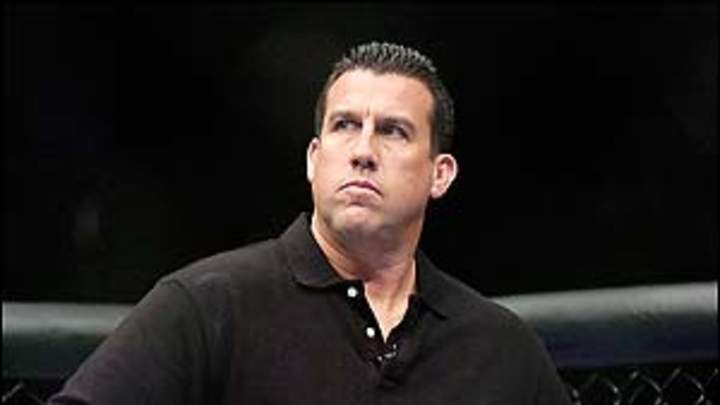Big John's new plan


After so many times of imploring mixed martial arts fighters, "Let's Get it On," John McCarthy sought trademark protection on the phrase. For more than a decade, "Big John," was the UFC's choice referee, a figure often referred to as the "Octagon's ninth side." After more than 500 bouts that trace the UFC's evolution, McCarthy retired -- sort of -- last week. Now he'll be getting it on for The Fight Network, North's America's only all-combat sports channel. He recently sat down with SI.com.
SI.com: What's behind the career move?
John McCarthy: With commission rules, it got harder for me do some things. Basically commissions thought it was a conflict of interest to do broadcasting of fighters if I would be refereeing those same fighters. So I got this opportunity with the fight network and it was time to make the move.
SI.com: So you are or aren't out of the Octagon for good?
McCarthy: No, it's possible I could do some fights. If it got to a point where it was outside Nevada and there wasn't the [conflict of interest rule] I would consider it. Maybe in another country. But right now, I didn't really have a choice.
SI.com:Obviously the UFC is a much different product now than it was when you started. Did you have problems with the sport then?
McCarthy: The first event I did was UFC II and there were problems. For one thing, the ref couldn't stop the fight. Rorion Gracie was the guy really in charge with everything and Rorion could give a damn about anybody except for his brother [Royce Gracie]. He cared about Royce and he knew that Royce knew what he was doing and would be okay. But the other guys were going out and [getting hurt.] Either the fighter could ask to stop or his corner could throw in the towel and say the fighter had enough. That was all nice. But what happened was that fighters were too proud to stop and they would tell their corners, "Don't you ever stop this fight. If you do, I'm going to beat your ass." And their corners believed in the fighters so they never threw in the towel.
I told the corners, 'If your fighter gets in trouble, I'm gonna tell you to watch your fighter. If your fighter is done, I'm gonna yell at you.' [The first time I did that] the corner shakes their heads no and throws the towel into the audience. I was like, 'We got problems. I can't do this any more.' Luckily, after that the rules changed so the ref had power to stop fights. Rules changes all the time back them. If you ask Dana White, he'll say there were no rules back then and that's not true. Dana doesn't know what he's talking about.
SI.com: Now that you're out of reffing, you have a favorite fighter?
McCarthy: My favorite goes beyond an ability to fight. It's his contributions to the sport, the way he treated people. If I were going to pick one it would be Randy Couture.
SI.com: It's no secret there's a continuum of opinions here. How you do characterize Dana White?
McCarthy: I characterize Dana as a committed businessman. He is a guy who works to death to promote the UFC and has done a good job of that. Has he made mistakes? Absolutely. Is he perfect? Absolutely not. Is everything he puts out to the media how the sport got started the truth? No. But he's dedicated and devoted. Because of Dana the sport has come to a higher level, no doubt about it. But it's not just because of Dana. Dana had Frank and Lorenzo Fertitta; he had money behind him.
SI.com: How did you prepare for refereeing fights?
McCarthy: I always went back and watched fights. Any referee in any sport will tell you they don't see the sport the same as a fan. Referees look at certain things. Who's taking control? Who's not? You end up watching the damaged fighter more than the one doing the damage. You basically end up only watching half the fight. So I would go back and make sure I watched the whole fight. Also, especially if I was refereeing someone I hadn't seen before, I would try to go back and watch tape. I wanted to know what they were good at and what I thought they weren't that good at. That would help me during the fight.
Sometimes athletic commissions wouldn't know who was fighting until the day of the show and that was tough. The more information you have, the more knowledge you have, the better you're going to be.
SI.com: You have a favorite fight?
McCarthy: I get asked that a lot and I'm never able to come up with just one. Everything is based on the importance of the fight, how the event would change things in the sport. Royce Gracie against Dan Severn in UFC IV was a big fight. We had a big grappler against a small jiu jitsu guy with better technique.
In UFC 14, Mark Coleman was dominating everyone with his wrestling ability and he fought Maurice Smith, a kickboxer. Maurice won the fight and showed that strikers can win. UFC 40 was Tito Ortiz against Ken Shamrock, which was a turning point for the UFC. Randy Couture's fights and Chuck Liddell were important.
Then my last fight was Roger Huerta versus Clay Guida. That's the kind of fight that I love.
SI.com: Not a bad fight to go out on.
McCarthy: Not bad at all. I thank them both for making it a memorable fight.
